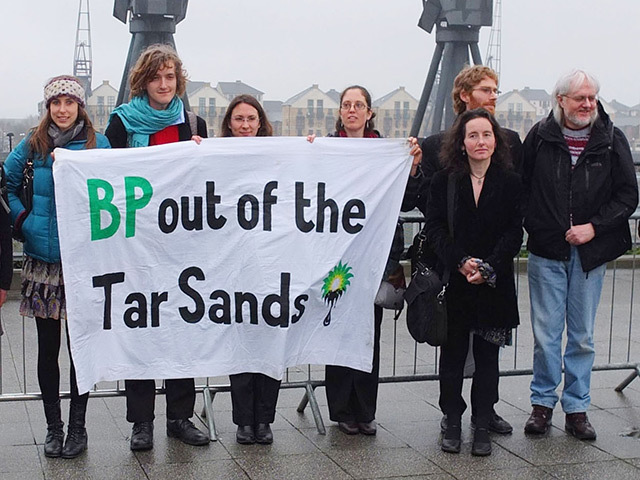
Controversial “tar sands” could flood into Europe and push up emissions if the European Union does not take action to stop them, campaigners have warned.
The amount of the heavy oil coming into the European Union could increase from 4,000 barrels per day (bpd) in 2012 to 725,000 bpd in 2020, a report from the US Natural Resources Defence Council (NRDC) has shown.
Between 5.3% and 6.7% of crude oil and transport fuel the EU uses could come from imported tar sands as Canada seeks to find a new market in the face of an oil glut in the US and as new pipelines open up routes to Europe.
The emissions from the extra tar sands, which are considered to be 23% more polluting than conventional oil, would be the equivalent of adding six million cars to Europe’s roads, green groups warned.
It would push up EU transport fuel emissions by 1.5%, the NRDC report said, making it harder to meet targets to tackle climate change.
The EU’s fuel quality directive demands a 6% cut in emissions from transport fuel by 2020, and efforts have been made to class tar sands as more polluting than conventional oil under the rules, which would effectively stop its import to EU countries.
However, the measures have yet to be decided on, and in its recent announcement on climate and energy strategy for 2030, the European Commission said it did not think it appropriate to set new carbon targets for transport fuel after 2020.
Abandoning targets for the fuel quality directive after 2020 would undermine efforts to reduce emissions from transport fuels this decade and beyond and open the door to tar sands coming into Europe, including the UK, environmentalists say.
Letting tar sands into Europe would make it more expensive to achieve the emissions reductions from transport, costing the EU an extra £3.3 billion to meet the 6% target.
The reductions would be likely to come from using more biofuels, which are counted in the EU as low carbon but which would increase pressure on food production and on the environment, green groups warned.
They called for the full implementation of the fuel quality directive to keep tar sands out of Europe and tackle emissions from transport.
Colin Roche, of Friends of the Earth Europe, said: “Trying to reduce the carbon emissions from our fuels by importing more of the most carbon-intensive fossil fuel in commercial production makes no sense. We need to keep tar sands out of Europe.”
Franziska Achterberg, Greenpeace EU transport policy director, said: “Canada’s politicians and their best friends from Shell and BP are desperate to open up new markets for their polluting oil.
“They have used all the tricks in the book for Europe to ignore its own environmental standards. If Europe fails to stand by its laws, it will allow a flood of tar sands to wreck its carbon footprint.”
Nusa Urbancic, clean fuels policy manager at Transport & Environment, said: “Europe needs to decarbonise its transport fuels in the most efficient way possible.
“Allowing dirty tar sands to flood into Europe is going to raise emissions – not lower them – and raise the costs of decarbonisation by billions of euros.”
Recommended for you
